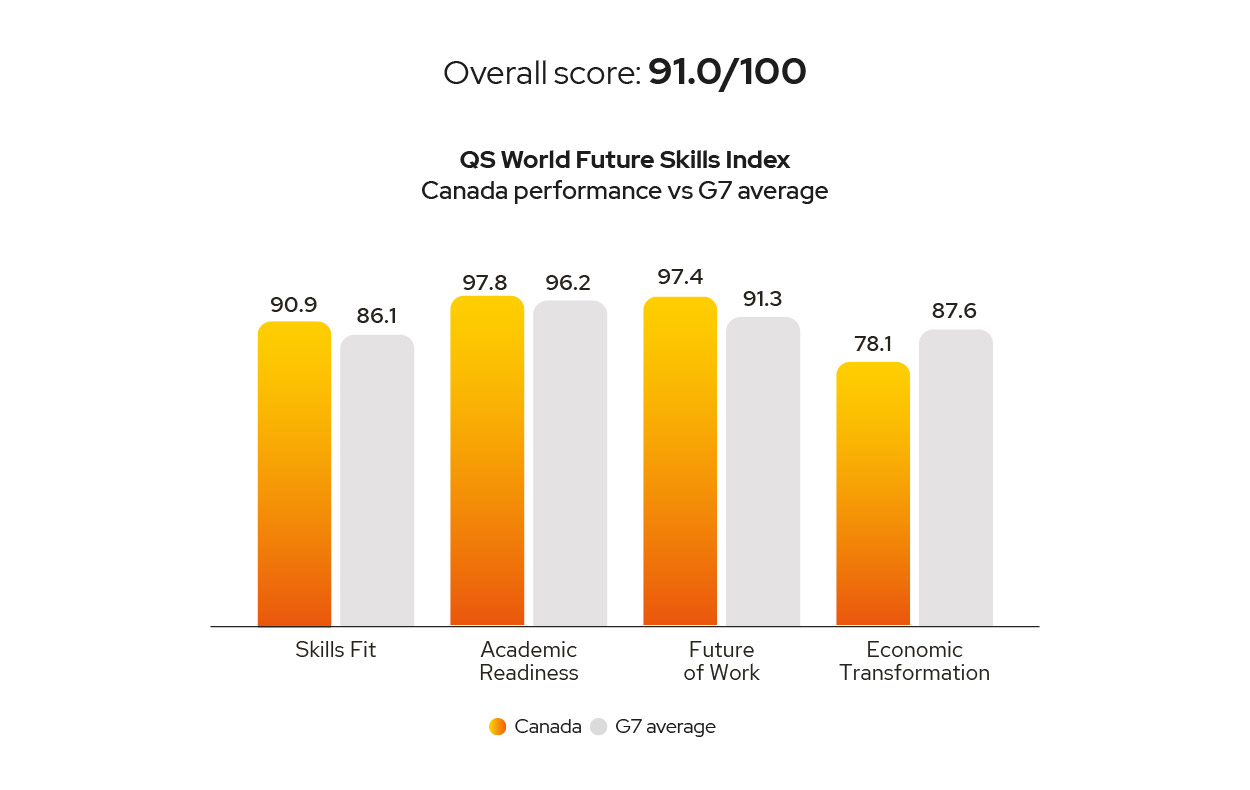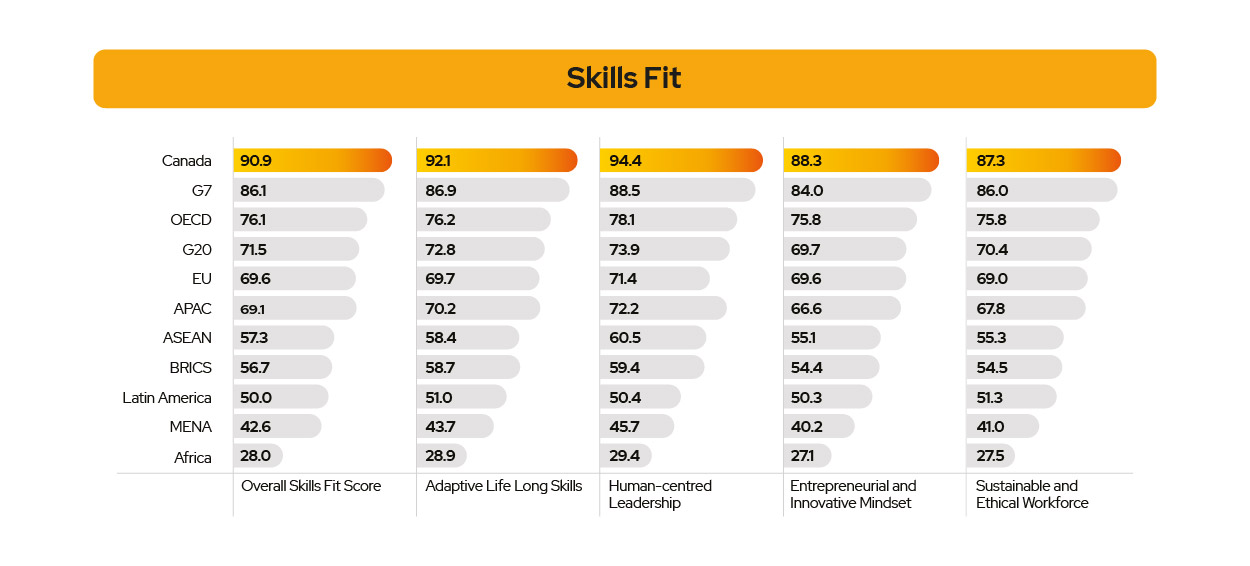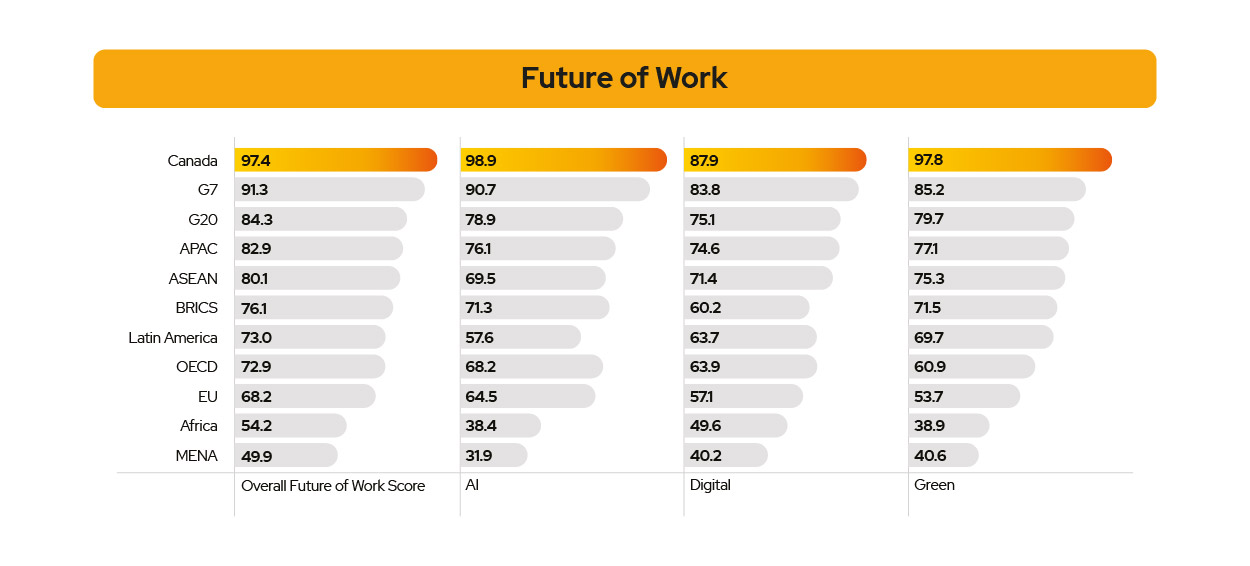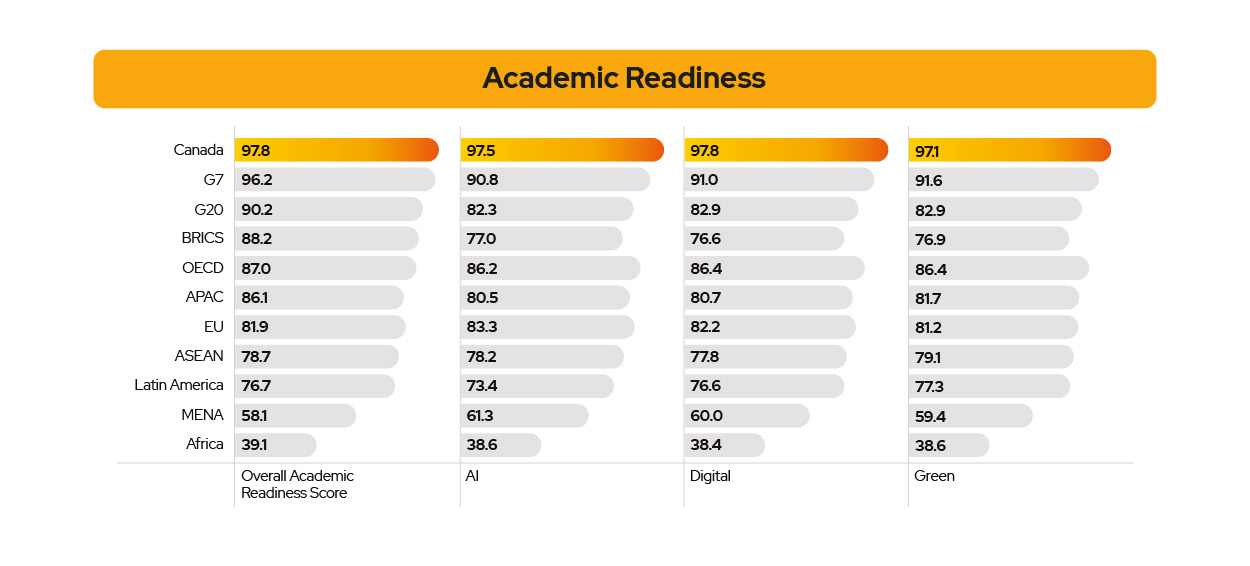Canada demonstrates strong Academic Readiness, with near-perfect scores in AI, Digital, and Green skills. However, weaker performance in Economic Transformation highlights a gap between academic excellence and innovation-led growth, with lower R&D investment and higher youth unemployment limiting the country’s ability to fully harness its future-ready talent.
Welcome to the Canada Spotlight on the QS World Future Skills Index, where we explore higher education’s critical role in shaping the workforce of tomorrow. This tailored resource empowers you to analyse Canada’s future skills supply and demand, benchmark key industry jobs and skills gaps against over 80 countries, and align your higher education system with the skills training required for economic transformation.
Canada performance overview
Canada’s higher education system stands out as a global leader in workforce alignment and future skills readiness. With near-perfect scores in Academic Readiness (97.8), Future of Work (97.4), and Skills Fit (90.9), Canada demonstrates world-class performance in producing talent equipped with AI, Digital, and Green expertise. However, its Economic Transformation score (78.1) reveals an important gap between education outcomes and broader economic impact. Compared with peers like the United States and Australia, Canada lags in research investment and faces higher youth unemployment. These figures underscore the need to scale R&D commercialisation, accelerate innovation diffusion, and translate academic excellence into sustainable, productivity-led growth.

About the indicators
Skills Fit
The Skills Fit indicator measures how well countries are equipping graduates with the skills that employers desire. This is assessed by determining the gap between what employers find important and their level of satisfaction with the skills provided by graduates. This is done using data from the QS Global Employer Survey, the largest of its kind, and data from the World Bank Group. Since 2021, over 100,000 employers have rated the importance of certain skills and their satisfaction in their graduate hires.
Future of Work
The Future of Work indicator evaluates a country’s readiness to recruit for the skills needed in the jobs of tomorrow. Specifically, it measures how well the job market is prepared to meet the growing demand for digital, AI, and green skills, all of which are becoming critical as economies transition towards technology-driven and sustainable industries.
Academic Readiness
This dimension measures how well a country is prepared for the future of work. We look at the number of universities assessed for the QS World University Rankings by Subject, and how they perform. We then measure this in tandem with population size – if a country has a large population but few well-ranked institutions, for example, the country will be penalised.
Economic Transformation
Economic Transformation uses a weighted formula to assess a country’s readiness to support the growth and future of work and skills by examining various key indicators. The Index highlights whether a country has the infrastructure, investment power, and talent available to transition to industries driven by AI, digital transformation, green technologies, and high-skilled work, using data from the World Bank Group, UNESCO Institute for Statistics and the Education Policy Institute
Canada performance in detail
Skills Fit

Canada’s Skills Fit score (90.9) confirms that its workforce is equipped with high levels of adaptability and leadership. Adaptive Lifelong Skills (92.1) and Human-Centred Leadership (94.4) indicate a culture of continuous learning and responsive management. However, Entrepreneurial and Innovative Mindset (88.3) and Sustainable and Ethical Workforce (87.3) slightly trail, suggesting opportunities to further nurture innovation culture and ethical transformation. Universities and employers must collaborate to embed real-world entrepreneurship and sustainability into lifelong learning pathways, ensuring that strong foundational skills also drive business creation and sector-wide innovation.
Future of Work

Canada’s Future of Work score (97.4) reflects near-complete alignment between academic output and employer demand. Employers consistently seek advanced skills in AI, Digital, and Green sectors, and Canadian institutions are delivering on that promise. However, translating this strong demand into innovation-led job creation requires more than just talent—it demands bold employer partnerships, work-based learning expansion, and investment in digital infrastructure. By embedding industry engagement across all sectors and ensuring access to hands-on experience, Canada can retain and activate its highly skilled graduates within a fast-evolving labour market.
Academic Readiness

Canadian universities perform exceptionally across future-focused disciplines—Green (97.1), Digital (97.8), and AI (97.5)—providing a strong academic pipeline for industry. However, Canada’s relatively low research investment hinders the full economic potential of this talent. By contrast, the United States invests over double that of Canada, enabling greater innovation impact. To compete globally, Canadian universities must deepen partnerships with employers, scale applied R&D initiatives, and ensure academic research is consistently translated into commercial products, policy innovation, and productivity gains.
Economic Transformation
.jpg)
Canada’s Economic Transformation score (78.1) reveals a disconnect between exceptional educational foundations and the ability to scale innovation-led growth. While Workforce Readiness (65.1) and Green Readiness (61.1) are strong, Economic Capacity (57.6) and Future-Oriented Innovation & Sustainability (51.3) remain lower than peers such as the United States and Australia. The issue is not the quality of graduates, but the structural bottlenecks in commercialisation and innovation absorption. Universities must focus on aligning their outputs with market needs, supporting emerging tech ventures, and embedding sustainability as a core innovation driver.
Conclusion and analysis
Canada’s education and workforce systems rank among the highest globally, but its Economic Transformation lags behind. Despite top-tier talent in AI, Digital, and Green fields, challenges remain in translating this into sustained innovation and job creation. With lower R&D investment and higher unemployment than peers, Canada must scale research commercialisation and industry collaboration to unlock the full value of its world-class graduates and future-ready institutions.
Our analysis and recommendations:
- Canada’s universities are among the world’s best at producing highly skilled graduates in AI, Digital, and Green domains. However, to ensure that Future of Work (97.4) and Academic Readiness (97.8) translate into long-term growth, institutions must strengthen partnerships with industry, focus on work-based learning, and scale up R&D commercialisation. Transforming research strength into enterprise impact will be key to national competitiveness.
- Despite world-leading education scores, Canada’s Economic Transformation score (78.1) and R&D investment levels trail global peers. Universities must close this gap by embedding innovation into curricula, expanding applied research, and collaborating more deeply with startups, businesses, and government. Fostering entrepreneurial ecosystems and sustainability-driven ventures will drive broader economic returns.
- With unmatched strength in future skills, Canada has an opportunity to lead the next phase of the global economy. But with high youth unemployment and low innovation absorption hindering progress, the focus must shift to systems that retain talent and deploy it effectively. Supporting graduate employment pathways, accelerating digital infrastructure, and embedding climate resilience across education and policy will ensure Canada’s future-readiness.









.jpeg)







.jpg)
.jpg)


.jpg)